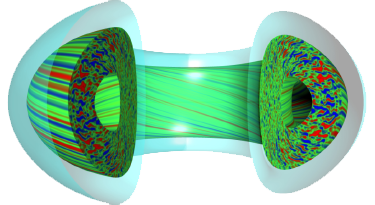Speakers
Description
Recently, an advanced plasma current tomography has been constructed on EAST, which combines Bayesian probability theory and neural networks. It is different from the previous current tomography using CAR prior. Here, CAR prior is replaced with Advanced Squared Exponential kernel function (ASE) prior. It can solve the deficiencies on CAR prior, where the calculated core current is lower than the reference current and the uncertainty becomes serious after adding the error in the diagnostics. ASE prior developed from Squared Exponential kernel function (SE) by combining reference discharge. ASE prior adopts non-stationary hyperparameter and introduces the profile of current into hyperparameter, which can make the shape of current more flexible in space. In order to provide a suitable reference discharge, a neural network model has also been trained.
| Country or International Organisation | China |
|---|---|
| Affiliation | University of Science and Technology of China, Hefei |

